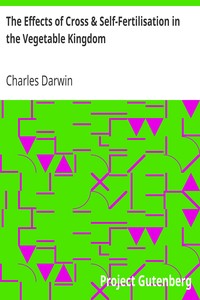The Effects of Cross & Self-Fertilisation in the Vegetable Kingdom by Darwin
"The Effects of Cross & Self-Fertilisation in the Vegetable Kingdom" by Charles Darwin is a scientific publication likely authored in the late 19th century. This work explores the mechanisms and implications of cross-fertilisation and self-fertilisation among plants, presenting experimental results that highlight their effects on the growth, vigor, and offspring characteristics of various species. Darwin aims to provide evidence on how these reproductive processes influence the overall health and adaptability of plant
species. At the start of the book, the introductory chapter sets the stage for the experiments that follow, discussing the importance of cross-fertilisation in enhancing plant vitality. Darwin outlines the various techniques and methodologies employed in his experiments, noting the benefits derived from different fertilisation methods. He emphasizes how the structure and timing of flowering organs are crucial in facilitating cross-fertilisation and showcases numerous instances of plants adapted exclusively for this purpose. Through detailed observations, Darwin reveals his hypothesis that cross-fertilisation results in more vigorous offspring than self-fertilisation, laying the groundwork for the extensive data and analysis that follow in subsequent chapters. (This is an automatically generated summary.)
Read or download for free
| How to read | Url | Size | |||
|---|---|---|---|---|---|
| Read now! | https://www.gutenberg.org/ebooks/4346.html.images | 1.1 MB | |||
| EPUB3 (E-readers incl. Send-to-Kindle) | https://www.gutenberg.org/ebooks/4346.epub3.images | 398 kB | |||
| EPUB (older E-readers) | https://www.gutenberg.org/ebooks/4346.epub.images | 415 kB | |||
| EPUB (no images, older E-readers) | https://www.gutenberg.org/ebooks/4346.epub.noimages | 388 kB | |||
| Kindle | https://www.gutenberg.org/ebooks/4346.kf8.images | 836 kB | |||
| older Kindles | https://www.gutenberg.org/ebooks/4346.kindle.images | 814 kB | |||
| Plain Text UTF-8 | https://www.gutenberg.org/ebooks/4346.txt.utf-8 | 971 kB | |||
| Download HTML (zip) | https://www.gutenberg.org/cache/epub/4346/pg4346-h.zip | 386 kB | |||
| There may be more files related to this item. | |||||
Similar Books
About this eBook
| Author | Darwin, Charles, 1809-1882 |
|---|---|
| Title | The Effects of Cross & Self-Fertilisation in the Vegetable Kingdom |
| Alternate Title | The Effects of Cross and Self-Fertilisation in the Vegetable Kingdom |
| Note | Wikipedia page about this book: en.wikipedia.org/wiki/The_Effects_of_Cross_and_Self_Fertilisation_in_the_Vegetable_Kingdom |
| Credits | Sue Asscher and David Widger |
| Reading Level | Reading ease score: 59.6 (10th to 12th grade). Somewhat difficult to read. |
| Language | English |
| LoC Class | QK: Science: Botany |
| Subject | Plants -- Variation |
| Subject | Fertilization of plants |
| Subject | Pollination |
| Category | Text |
| EBook-No. | 4346 |
| Release Date | Aug 1, 2003 |
| Most Recently Updated | Jun 28, 2023 |
| Copyright Status | Public domain in the USA. |
| Downloads | 459 downloads in the last 30 days. |
| Project Gutenberg eBooks are always free! | |

